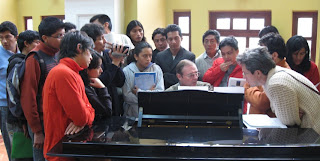
Hola amigos!
I am in Vilcabamba, the valley of eternal youth. Beautiful views and the weather is fabulous--warm yet crisp. The altitude is around 5000 feet approx. The image above is on my very balcony.
I have been on the road, (the "gringo trail" we used to call it). From the jungle, (Tena and then Patate), I made my way through Banos to Quito, ever increasing in altitude. Quito at approximately 7000 feet is lovely with great weather, leaning to the cooler temps. It is a huge city now with too much traffic, too much noise, too many people. Lots of culture--museums, arts, music--and lots of shopping.Ecuadorian people cannot be stereotyped any more than other countries/cultures. People tend to be very polite and friendly. Laughter is common and, when you know people well, they tend to be very honest and open. They also do not get upset over things like travel snafus because everyone here knows that being polite by smiling and asking "how is your day" will get you much further than showing frustration -- good naturedness. I am enjoying this paradisiacal place. I love the mountains, the people, the mountain air and the bright sun.Left Quito on Saturday, traveling 10 hours by bus ($10.00) to Cuenca. Cuenca is a far from Quito and somewhat off the beaten track. It is colonial with attendant architecture and history. Higher in altitude than Quito, therefore, cooler. Very "rustic" outside of the city--some communities are without electricity still.Three days in Cuenca at a great hostel with a lovely courtyard. Very comfortable. All hostels and hotels provide continental breakfast with bread, cheese, jam, coffee con leche...sometimes eggs. All guests were gringos--meaning European, USA, Canada, Australian travelers. This is what I mean by the "gringo trail". Travelers share information and travel together or meet up in unexpected places.Cuenca is a popular place for studying Spanish or Kichwa (the native language). Of note, Cuenca has become quite popular with USA retirees looking to buy property and live here. There are growing communities of ex-pats in several places in Ecuador. Why? It is cheaper to live, certainly. The natural environment is fabulous here and the Ecuadorian government is making the most of it by establishing large protected areas--national parks, etc. Coast, mountains, jungle--rain forest and cloud forest--there are many endemic species of birds and plants. Of course, there are worries about moving to another country--healthcare in particular--but, that's another story. (look up International Living, if interested).Back to Cuenca, the hostel and the travelers there, which included:* 2 young (19 years old) Norwegian girls studying Spanish and going to live with host family in Cuenca. They plan to stay in S America for 7 months.* 2 young (19-20 years old) American girls--One had studied in Cuenca last year and wanted to return to friends, the other is studying Kichwa (She does not speak Spanish) and plans to volunteer with a group called WOOF--something about world organic gardeners who volunteer to work on a farm in exchange for free room and board. Hmmmm. Interesting idea but free farm labor is a new concept here. They plan to stay a long time. I have my doubts.* 1 retiree from Colorado, a man looking for places for him and his wife to move. He prefers Asia and speaks no Spanish.* 1 retiree from Rochester, NY, a single male, has found a place he wants to buy. Left the hotel to study Spanish (beginning) and live with a family.* A couple from Great Britain--teachers--long time travelers in S. America. Speak Spanish. Fun.* Several Americans roughly my age that I didn't meet. One guy stayed at the hostel all day every day--reading and working on his laptop--started drinking beer after breakfast. (I think he couldn't leave after several. Very quiet guy)* 1 Italian gynecologist who lives in Madrid. We had fun--went on a hiking tour together. We shared lots of coffee and interesting conversation.* 1 Swiss long time traveler--great Spanish (He had lived with a Cali Colombia woman for several years). Headed for Peru, then home.* 1 Swiss young woman (around 25 years old). A nurse with good English, but no Spanish. Very nice.Vilcabamba is wonderful (6 1/2 hour incredible--high mountain/hair pin curves--bus ride from Cuenca--$9.00). I am off to hike a trail through one of the natural reserves.Greetings and saludos to all.

















